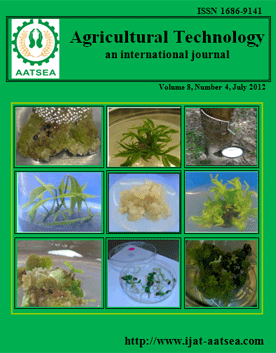ThaiScience
ThaiScience
INTERNATIONAL JOURNAL OF AGRICULTURAL TECHNOLOGY
Volume 14, No. 05, Month SEPTEMBER, Year 2018, Pages 717 - 730
Fluorescent inter simple sequence repeat (f-issr) markers and capillary electrophoresis to assess genetic diversity and relatedness within commercial sugarcane varieties
Mondal, A., Pal, T. and De, K. K.
Abstract Download PDF
The proper selection of genetically rich diverse parents is a very useful strategy for the success of sugarcane breeding program. One of the crucial factors in sugarcane breeding and sugar production is the selection of the suitable variety because different varieties have different yield potentials, pest and disease resistance property and is bred for different ecological and economic conditions. The level and patterns of molecular genetic diversity and establishing relationships among 19 varieties of sugarcane using fluorescent Inter Simple Sequence Repeat (F-ISSR) markers and capillary electrophoresis was evaluated. Out of nine primers, 3 primers were found to give clear and polymorphic patterns. F-ISSR primers were labeled with 6-carboxyfluorescein and consists of di-nucleotide motifs. Total countable bands were 1142 among which 1099 comprised of polymorphic markers, with an average of 366 polymorphic bands per primers. Dendrogram showed that there are 5 clear clusters. The size range of the amplification products varied from 50.14 to 500bp. A total number of 246 alleles were detected per primer and the average number of allele per locus was 12.95.Only two monomorphic bands were detected with two primers at a particular locus. 41 unique bands were identified. The study showed that the F-ISSR markers detected high level of polymorphism (96.42 %) or genetic diversity among nineteen varieties of sugarcane. The present information recoded in this study would definitely give a useful guideline in planning hybridization for the maintenance and improvement of genetic diversity in sugarcane varieties.
Keywords
allele, dendrogram, genetic diversity, sugarcane, 6-carboxyfluorescein.INTERNATIONAL JOURNAL OF AGRICULTURAL TECHNOLOGY
Published by : Association of Agricultural Technology in Southeast Asia (AATSEA)
Contributions welcome at : http://www.ijat-aatsea.com
